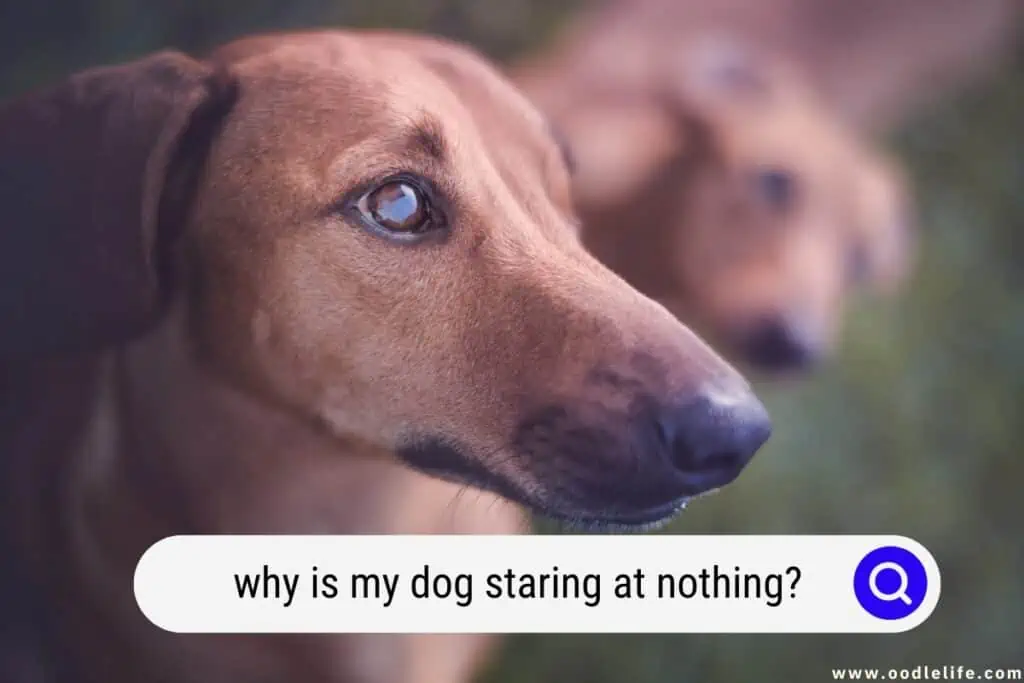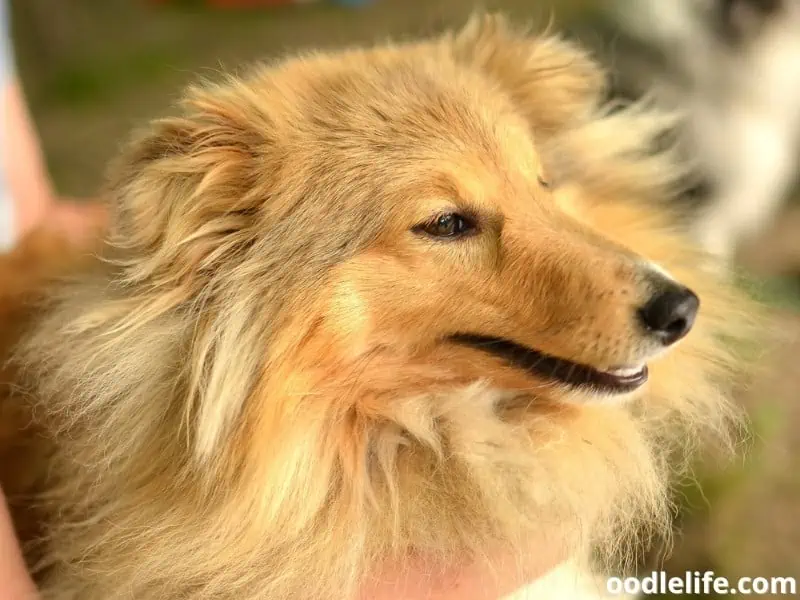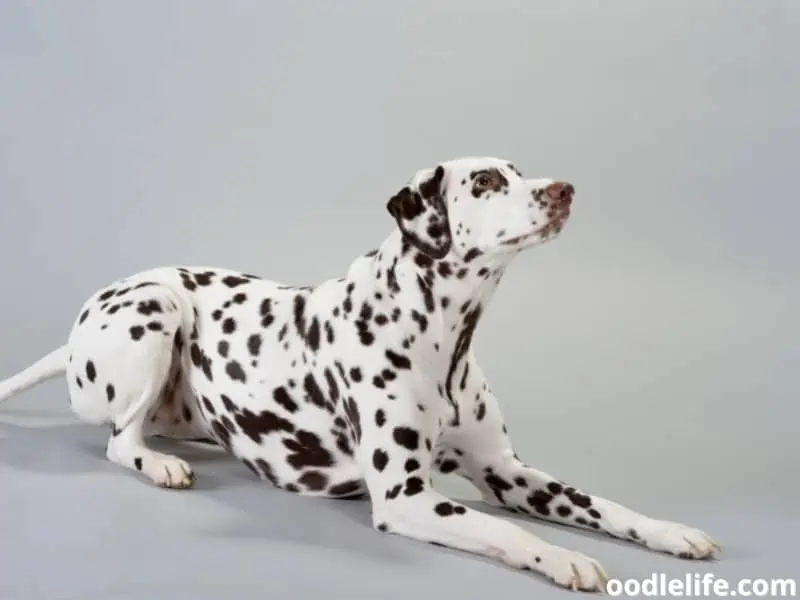Why Is My Dog Staring At Nothing? [Explained]
All dog owners know that it can be a tad disconcerting when our beloved pooches exhibit some strange behaviors. Their quirkiness is endearing, but it also can be worrisome if the behavior could be due to something medical.
Almost all dog parents know the intense look of concentration that their dogs get, especially when they see treats! However, what about if your dog gets that look and stares at nothing? It could be the wall, a closed door, or simply into space.

Your dog’s unwavering stare at nothingness might mean something harmless. After all, haven’t you ever been caught by someone while you were lost in your thoughts and looking blankly while your mind is going a million miles a minute elsewhere?
However, there are also several medical reasons why your dog might be looking all spacey. To be sure, we’ll have to rule them out before addressing the potential behavioral reasons!
Medical Reasons
Before you giggle at your dog’s weird eccentricities, you might want to rule out these potential medical reasons completely. Although they are rarer than behavioral reasons, they would require immediate professional help.
1. Seizures
Canine epilepsy is a neurological disorder that can cause mild to severe seizures in dogs. In addition to convulsions and other more obvious symptoms, a sign that a dog is having a seizure is also them staring blankly at nothingness and looking terribly confused.

Owners of epileptic dogs must take special steps to identify and manage the condition, from recognizing signs and symptoms to providing support during a seizure.
Owners need to understand their pup’s individual reaction to seizures to devise an effective treatment plan that keeps their pets comfortable, safe, and healthy. Proactive management strategies can help reduce the frequency and severity of seizures, as well as minimize any long-term damage that could be caused by recurrent episodes.
2. Worsening or Loss of Vision
A dog with worsening vision could be straining to see something that they ordinarily would have no trouble seeing and appear to be staring at nothing.

Infections, disease, and physical trauma can all lead to vision impairment in dogs. For example, corneal ulcers are caused by bacteria that enter the eye through scratches or other injuries.
In addition, certain viruses, such as canine herpesvirus, can cause inflammation in the eyes that lead to blindness. If a dog suffers an infection or severe injury that affects its eyesight, it may require medical intervention to restore its vision.
As dogs age, they may develop cataracts which can lead to vision problems or even complete blindness if left untreated. Cataracts occur when proteins accumulate on the lens of the eye and block light from entering it properly.
Treatment is possible through surgery but only if caught early enough. Additionally, glaucoma is another condition that affects older dogs more frequently than younger ones; pressure builds up in the eye due to fluid buildup causing irreversible damage if not treated immediately with medication or surgery.
Certain breeds are predisposed to certain genetic conditions which may cause vision impairment or blindness in puppies born with them. Progressive retinal atrophy (PRA) is one such condition caused by the degeneration of photoreceptor cells in the retina and leads to gradual blindness over time.
There is no cure for this condition so preventative measures should be taken if you own a breed known for its susceptibility to PRA such as Retrievers and Toy Poodles.
Lastly, diabetes is another key reason for the loss of vision in dogs. If your furry friend has diabetes, their ability to see and navigate can quickly deteriorate as excess blood glucose strips away the nourishment needed for healthy eyesight.
Unfortunately, such vision loss can be permanent if not managed promptly by veterinary professionals. Furthermore, months or even years of living with undiagnosed or untreated diabetes leads to increased risks for other conditions such as heart disease, kidney failure, and nerve damage.
Vision loss can be heartbreaking for any pet owner but knowing what causes it can help you prepare for it before it happens and take action quickly if it does occur. Infections, age-related conditions, genetic diseases—these are all potential causes of vision loss in dogs so make sure you provide your pup with regular checkups so any issues may be identified early on and treated promptly before they become too serious.
3. Confusion or Cognitive Dysfunction Syndrome (CDS)
Somewhat akin to human dementia, Cognitive Dysfunction Syndrome typically affects aging dogs but can strike dogs of all ages. The confusion caused by the condition can trigger a dog to stop and stare randomly or act extremely confused and lost.

CDS in dogs is an important issue requiring attention since it can drastically affect a dog’s quality of life. Just as humans can suffer from “senior moments” or lose their memories, so too can our canine companions experience age-related cognitive decline.
While treatments for symptoms of CDS exist and may help improve the lives of affected canines, prevention is key. Dog owners should be cognizant of what signs to look out for and pay close attention to possible changes in their pet’s behavior.
This could include anything from a decrease in activity level or mood to unusual changes in sleep cycles or disorientation throughout their home environment.
4. Liver disease
Even some diseases like those of the liver can cause confusion in dogs! When the liver is unable to efficiently remove toxins from the body, those toxins accumulate and can lead to neurological damage. A confused dog will always tend to stop randomly and stare, whether intently or with a spaced-out look.

This behavior is commonly known as “hepatic encephalopathy” which can impact a dog’s memory, and ability to recognize its environment or remember commands. Early detection of liver issues is key to preventing this condition and other secondary conditions that may arise due to an unhealthy liver.
It is important to visit the vet regularly so any signs of liver disease can be treated right away and protect your beloved companion from confusion or other health issues down the road.
5. Food Toxicity
Dogs are gluttons and will get into everything! Not all human food is suitable for your dog, and if your dog has accidentally ingested something it wasn’t supposed to, it might have a bad cause of toxicity or poisoning, especially if it starts acting confused and staring blankly.

Some examples of common human food that are toxic to dogs include chocolate, garlic, onions, xylitol (the artificial sweetener often found in gum), grapes, and raisin.
In addition, if you haven’t locked up your medications, certain classes of meds like benzodiazepines can severely affect your dog and make them all spaced out.
To prevent any accidental poisonings, make sure you keep all your human food out of reach and stash your medications securely away. If you suspect your dog has eaten something toxic to them, it would be best to get to the vet’s to be sure.
Behavioral Reasons
Not all the reasons that your dog is staring at nothing are medical. More often than not, your dog is simply displaying strange behavior infrequently because of these reasons.
1. Asking for attention
Think back to the last time that you caught your dog staring at nothing. What did you do? Did you go over and give your pooch a pat or a hug, or did you start talking to your dog and giving it attention?

It simply might have learned that a blank stare can get some attention and love!
2. Your dog hears something
Your dog’s hearing is about four times more acute than yours. Your dog might simply be listening to something that is out of your range, and it is processing that information. Look out as well for the adorable head-cock that all dogs do when they want to hear something better!

3. Your dog smells something
Although impressive in itself, a dog’s sharp hearing is nothing compared to its formidable sense of smell. It is estimated that a dog’s sense of smell is 10,000 to 100,000 times better than ours, which means that they see the world in a completely different way.

Most of the information that they gather is through their sense of smell, while in humans, it is usually visual or at times, audio. Your dog might simply be catching a whiff of something in the air and is processing the information.
4. Your dog is bored
When dogs are bored and not provided with adequate stimulation, they will often engage in compulsive behaviors such as excessive licking, continual barking, constantly chasing their tails, and yes, staring blankly!

Many of these behaviors are attempts to cope with boredom, though it can be an indicator of more serious psychological issues if continued for a long period.
Keeping a dog entertained and engaged can be a challenging task for any pet parent. The key to keeping your pup active and happy is to provide them with plenty of enjoyable stimulation. With some creativity and daily physical activity, it should be quite easy for you and your pooch to stay happily engaged all year long.